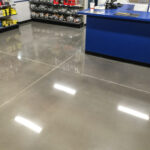Introduction
When it comes to installing vinyl flooring on concrete, choosing the right adhesive is crucial. A high-quality adhesive ensures that the vinyl planks or tiles bond securely to the concrete surface, providing durability and longevity to your flooring. In this article, we will explore the best adhesive options available for tekno-step vinyl flooring on concrete, considering factors such as performance, ease of use, and compatibility.

Understanding Vinyl Flooring on Concrete
Vinyl flooring is a popular choice due to its versatility, affordability, and ease of maintenance. When installing vinyl flooring on concrete, it is essential to prepare the surface properly to ensure a successful installation. Concrete should be clean, dry, and level before applying any adhesive. Proper surface preparation ensures better adhesion and prevents future issues such as lifting or buckling of the flooring.
Importance of Choosing the Right Adhesive
The adhesive used for vinyl flooring plays a significant role in the overall performance and longevity of the installation. The right adhesive provides a strong bond between the vinyl and concrete, ensuring stability and durability. Using an inappropriate adhesive can lead to adhesive failure, which may result in loose or damaged flooring over time. Therefore, selecting the best adhesive is crucial to achieve a successful vinyl flooring installation.
Types of Adhesives for Vinyl Flooring
There are several types of adhesives available for vinyl flooring installations. Let’s explore some common options:
1. Pressure-Sensitive Adhesives
Pressure-sensitive adhesives (PSAs) are popular for vinyl flooring installations. These adhesives have an aggressive tackiness that forms an immediate bond when pressure is applied during installation. They are easy to use and provide excellent bond strength. PSAs are particularly suitable for luxury vinyl tiles (LVT) or planks with a self-adhesive backing.
2. Modified Loose-Lay Adhesives
Modified loose-lay adhesives are designed to provide a semi-permanent bond. They offer some repositionability during installation, making them ideal for DIY projects or temporary flooring installations. These adhesives create a strong bond once the flooring is rolled with a weighted roller.
3. Full Spread Adhesives
Full spread adhesives are the most commonly used adhesives for vinyl flooring on concrete. They require the adhesive to be applied to the entire subfloor before laying the tekno-step vinyl flooring. Full spread adhesives provide a strong and permanent bond, ensuring the flooring remains securely in place.
4. Epoxy Adhesives
Epoxy adhesives are known for their exceptional strength and durability. They are often used in commercial or industrial settings where high-performance flooring is required. Epoxy adhesives are resistant to heavy traffic, moisture, and chemicals, making them suitable for challenging environments.
Also Read:
- 16 Types of Cement used in Construction Work
- What is Portland Cement and How it is Manufactured?
- 7 Popular Types Of Flooring For Homes To Be Considered
Factors to Consider When Selecting an Adhesive
When choosing an adhesive for vinyl flooring on concrete, consider the following factors:
1. Compatibility with Vinyl Flooring
Ensure that the adhesive is compatible with the specific type of vinyl flooring you are installing. Different adhesives are formulated for different vinyl flooring materials, such as LVT, vinyl sheet, or vinyl tiles. Check the manufacturer’s guidelines to determine the recommended adhesive for your flooring.
2. Moisture Resistance
Concrete floors can be prone to moisture issues. Select an adhesive that offers moisture resistance or moisture mitigation properties. Moisture-resistant adhesives help prevent water damage, mold, and mildew growth under the flooring.
3. Application Method
Consider the application method required for the adhesive. Some adhesives come in pre-mixed form, while others require mixing before application. Choose an adhesive that aligns with your installation preferences and capabilities.
4. Drying Time
The drying time of the adhesive is an important factor to consider, especially if you have time constraints. Quick-drying adhesives allow for faster installation, while slower drying adhesives provide more time for adjustments during the installation process.
5. VOC Emissions
Volatile organic compounds (VOCs) are chemicals that can be released from certain adhesives, potentially causing health concerns and contributing to poor indoor air quality. Look for low VOC or VOC-free adhesives to minimize environmental impact and ensure the better air quality in your living space.
Best Adhesive Options for Vinyl Flooring on Concrete
After careful consideration of various factors, here are some of the best adhesive options for vinyl flooring on concrete:
1. Adhesive A: High-Strength Pressure-Sensitive Adhesive
- Description: A premium pressure-sensitive adhesive designed for luxury vinyl tiles and planks.
- Benefits: Provides excellent bond strength, easy installation, and compatibility with a wide range of vinyl flooring materials.
- Application: Suitable for both residential and commercial applications.
2. Adhesive B: Multi-Purpose Modified Loose-Lay Adhesive
- Description: A versatile adhesive suitable for vinyl flooring installations that require some repositionability.
- Benefits: Offers flexibility during installation, strong bond once rolled with a weighted roller, and easy cleanup.
- Application: Ideal for DIY projects or temporary flooring installations.
3. Adhesive C: Premium Full Spread Adhesive
- Description: A high-quality full spread adhesive formulated specifically for vinyl flooring on concrete.
- Benefits: Provides a strong and permanent bond, excellent moisture resistance, and compatibility with various vinyl flooring types.
- Application: Recommended for both residential and commercial installations.
4. Adhesive D: Industrial-Grade Epoxy Adhesive
- Description: A heavy-duty epoxy adhesive suitable for demanding environments and commercial settings.
- Benefits: Offers exceptional strength, durability, moisture resistance, and chemical resistance.
- Application: Ideal for high-traffic areas, such as commercial kitchens, hospitals, or warehouses.
Step-by-Step Guide to Applying Adhesive for Vinyl Flooring on Concrete
To ensure a successful vinyl flooring installation on concrete, follow these steps:
- Prepare the concrete surface by cleaning it thoroughly and ensuring it is dry and level.
- Read and follow the manufacturer’s guidelines for the specific adhesive you have chosen.
- Apply the adhesive according to the recommended application method, either by spreading it uniformly across the entire subfloor or in designated areas.
- Use the appropriate trowel or tool to ensure an even and consistent application of the adhesive.
- Place the vinyl flooring onto the adhesive, aligning it correctly with the surrounding tiles or planks.
- Press down firmly on the flooring to ensure proper adhesion.
- Roll the flooring with a weighted roller to further enhance the bond between the vinyl and the adhesive.
- Allow the adhesive to dry completely according to the manufacturer’s instructions before allowing foot traffic or placing heavy furniture.
Conclusion
Choosing the best adhesive for vinyl flooring on concrete is essential for a successful and long-lasting installation. Consider factors such as compatibility, moisture resistance, application method, drying time, and VOC emissions when selecting an adhesive. Based on these considerations, the recommended adhesive options include high-strength pressure-sensitive adhesives, multi-purpose modified loose-lay adhesives, premium full spread adhesives, and industrial-grade epoxy adhesives. By following proper installation techniques and using the right adhesive, you can enjoy beautiful and durable vinyl flooring on your concrete surface.
FAQs
1. Can I install vinyl flooring on concrete without adhesive?
While certain vinyl flooring options come with a self-adhesive backing, using adhesive is generally recommended for a more secure and long-lasting installation, especially on concrete surfaces.
2. How long does the adhesive take to dry?
The drying time of the adhesive varies depending on the specific product and environmental conditions. It is crucial to follow the manufacturer’s instructions regarding drying time to ensure the adhesive sets properly before allowing foot traffic or placing heavy objects on the flooring.
3. Can I use the same adhesive for all types of vinyl flooring?
No, different types of vinyl flooring may require specific adhesives. It is essential to consult the manufacturer’s guidelines to determine the recommended adhesive for your specific flooring material.
4. Are VOC emissions harmful to health?
VOC emissions can contribute to poor indoor air quality and may cause health issues, especially for individuals with respiratory sensitivities. Opting for low VOC or VOC-free adhesives can help minimize potential health risks.
5. Where can I get the recommended adhesives for vinyl flooring?
You can find the recommended adhesives at local home improvement stores, flooring specialty stores, or through online retailers. Ensure that you purchase the adhesive from reputable sources to ensure quality and authenticity.





